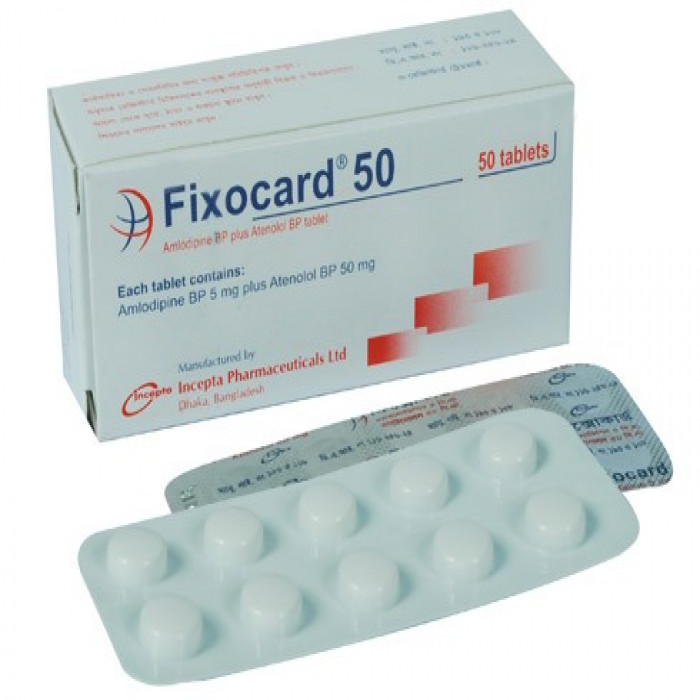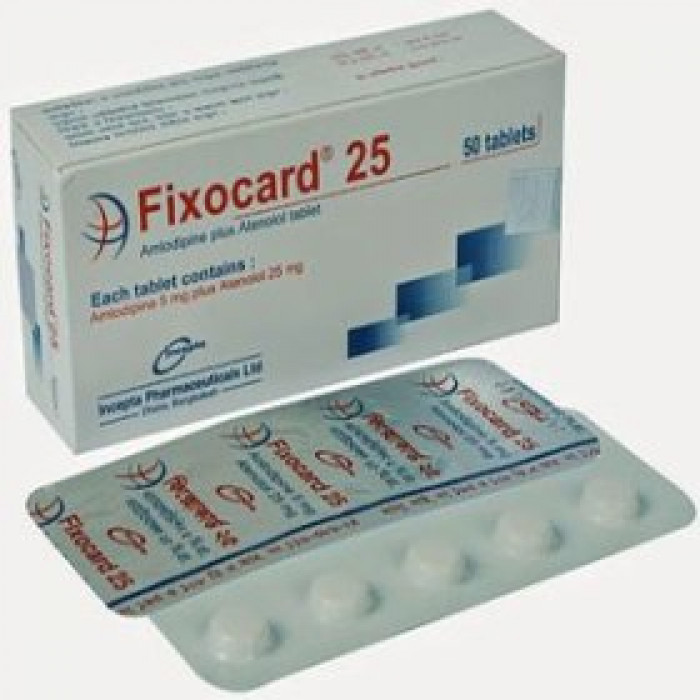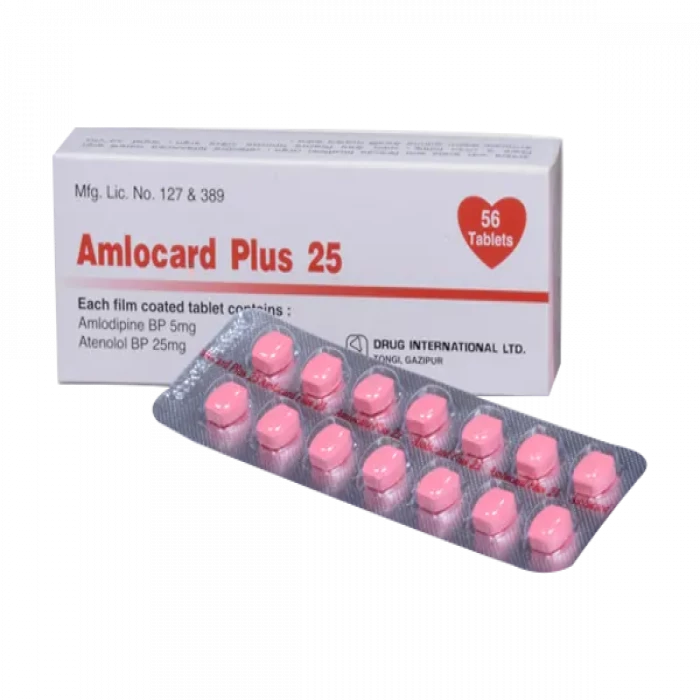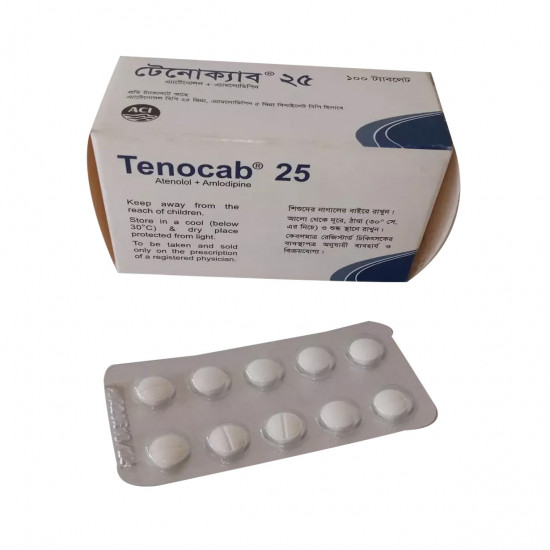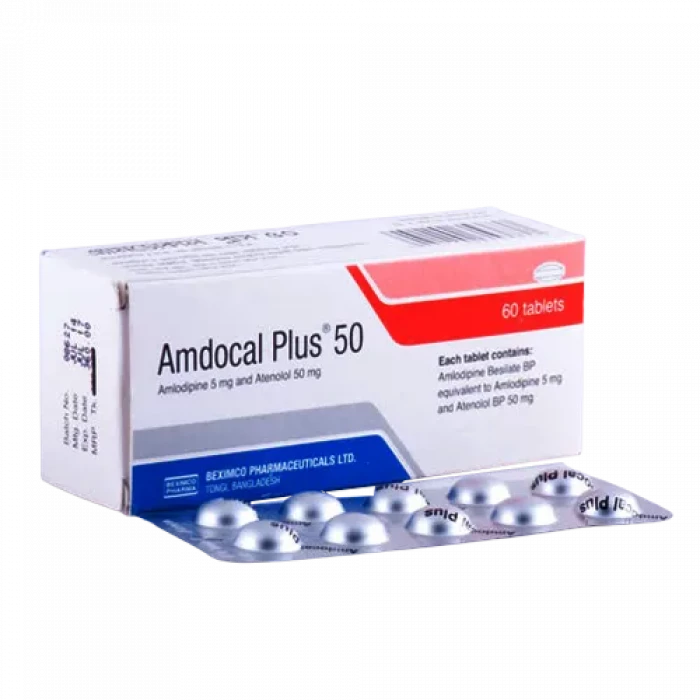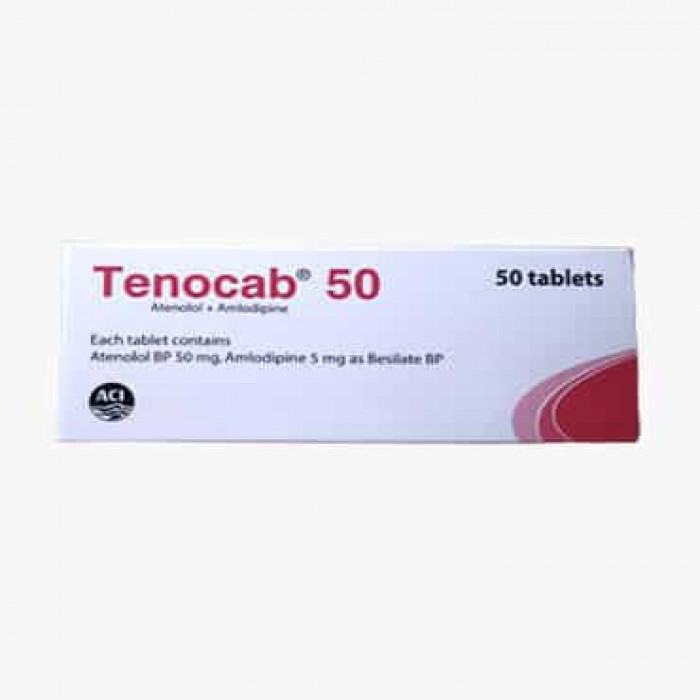Due to National Election, orders may be processed slight delay, nationwide.
Leading Online Pharmacy of Bangladesh
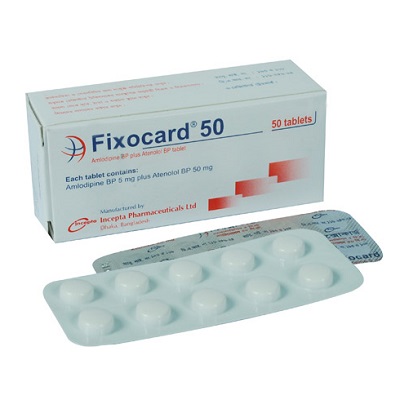
✔ 100% Authentic Product
👁️ Currently Viewing 3683
Fixocard 50mg 10Pcs
- Fixocard 50 is a combination medication used to treat high blood pressure.
- It works by lowering blood pressure and reducing the risk of heart attack and stroke.
- Regular exercise, weight control, and a healthy diet can also help control blood pressure while taking Fixocard 50.
Discount
Price: ৳ 76
MRP:
৳
80
5%
Off

100% Genuine Products, Guaranteed

Safe & Secure Payments, Always

Fast, Secure & Efficient Delivery

Proper Packaging
 Cash on Delivery - All over Bangladesh
Cash on Delivery - All over Bangladesh Regular Delivery - 12-24 Hours, Dhaka City* Charge Tk.39-59
Regular Delivery - 12-24 Hours, Dhaka City* Charge Tk.39-59 Regular Delivery - 24-48 Hours, Other Cities* Charge Tk.99-110
Regular Delivery - 24-48 Hours, Other Cities* Charge Tk.99-110
 ফ্রি ডেলিভারিঃ - ৯৯৯ টাকা+ অর্ডারে, ঢাকা
শহরে
ফ্রি ডেলিভারিঃ - ৯৯৯ টাকা+ অর্ডারে, ঢাকা
শহরে ফ্রি ডেলিভারিঃ - ২৯৯৯ টাকা+ অর্ডারে, ঢাকার
বাহিরে
ফ্রি ডেলিভারিঃ - ২৯৯৯ টাকা+ অর্ডারে, ঢাকার
বাহিরে
100% Genuine Products, Guaranteed
Safe & Secure Payments, Always
Fast, Secure & Efficient Delivery
Proper Packaging
 Cash on Delivery - All over Bangladesh
Cash on Delivery - All over Bangladesh Regular Delivery - 12-24 Hours, Dhaka City* Charge Tk.39-59
Regular Delivery - 12-24 Hours, Dhaka City* Charge Tk.39-59 Regular Delivery - 24-48 Hours, Other Cities* Charge Tk.99-110
Regular Delivery - 24-48 Hours, Other Cities* Charge Tk.99-110 ফ্রি ডেলিভারিঃ - ৯৯৯ টাকা+ অর্ডারে, ঢাকা
শহরে
ফ্রি ডেলিভারিঃ - ৯৯৯ টাকা+ অর্ডারে, ঢাকা
শহরে ফ্রি ডেলিভারিঃ - ২৯৯৯ টাকা+ অর্ডারে, ঢাকার
বাহিরে
ফ্রি ডেলিভারিঃ - ২৯৯৯ টাকা+ অর্ডারে, ঢাকার
বাহিরে
✅ Description:
Fixocard 50 is a medication used to treat high blood pressure. It is a combination of two drugs that work together to lower blood pressure and reduce the risk of heart attack and stroke. It should be taken at the same time each day and for as long as advised by a doctor. Regular exercise, weight control, and a healthy diet can also help control blood pressure. Side effects may include headache, ankle swelling, slow heart rate, and nausea, and it may also cause dizziness. Regular monitoring of blood pressure, kidney function, and electrolytes level may be required while taking this medication. It is important to inform the doctor of any other medications being taken and any liver or kidney problems. Pregnant or breastfeeding women should consult their doctor before taking this medication.
Safety Advices

Alcohol
UNSAFE
It is unsafe to consume alcohol with Fixocard 50.

Pregnancy
CONSULT YOUR DOCTOR
Please consult your doctor before taking Fixocard 50

Breastfeeding
CONSULT YOUR DOCTOR
Please consult your doctor before taking Fixocard 50

Driving
UNSAFE
Fixocard 50 may cause side effects which could affect your ability to drive.

Kidney
CAUTION
Fixocard 50 should be used with caution in patients with kidney disease.

Liver
CAUTION
Fixocard 50 should be used with caution in patients with liver disease.
✔️ Uses of Fixocard 50
- Treatment of hypertension
✔️ Side Effects of Fixocard 50
Fixocard 50 is well tolerated. Overall side effects include-
Fatigue
- Headache
- Edema
- Nausea
- Drowsiness
- Anxiety
- Depression
✔️ How to use Fixocard 50
Take this medicine in the dose and duration as advised by your doctor. Swallow it as a whole. Do not chew, crush or break it. Fixocard 50 is to be taken empty stomach.
✔️ Indications of Fixocard 50
This is indicated in-
- Patients with essential hypertension
- Patients with angina pectoris & hypertension as co-existing diseases
- ln post Ml patients
- ln patients with refractory angina pectoris where nitrate therapy has failed.
✔️ Pharmacology of Fixocard 50
This is a fixed-dose combination of Amlodipine and Atenolol. Amlodipine is a dihydropyridine calcium antagonist that inhibits the transmembrane influx of calcium ions into vascular smooth muscle and cardiac muscle; it has a greater effect on vascular smooth muscle than on cardiac muscle. Amlodipine is a peripheral vasodilator that acts directly on vascular smooth muscle to cause a reduction in peripheral vascular resistance and reduction in blood pressure. Amlodipine reduces tone, decreases coronary vasoreactivity, and lowers cardiac demand by reducing afterload.
Atenolol is a cardioselective beta-blocker. The cardio-selectivity is dose-related. Atenolol causes a reduction in blood pressure by lowering cardiac output, decreasing plasma renin activity, and sympathetic outflow from CNS. Atenolol also causes a reduction in myocardial oxygen demand by virtue of its negative inotropic and negative chronotropic effects.
✔️ Dosage & Administration of Fixocard 50
Adult: This therapy is initiated with a single dose of this preparation depending upon the therapeutic response, titration of the dosage is recommended.
In elderly patients: It is advisable to initiate the therapy with ½ tablet of a fixed-dose combination of Amlodipine & Atenolol, i.e., 2.5 mg of Amlodipine & 25 mg Atenolol.
✔️ Interaction of Fixocard 50
Disopyramide: Atenolol reduces the clearance of disopyramide by 20%. Additive negative inotropic effects on the heart may be produced.
Ampicillin: doses of 1 gm and above may reduce Atenolol levels.
Oral antidiabetics and insulin: Beta-blockers may decrease tissue sensitivity to insulin and inhibit insulin secretion e.g. in response to oral antidiabetics. Atenolol has less potential for these actions.
✔️ Contraindications of
Hypersensitivity to either component, sinus bradycardia, second and higher degrees of heart block, cardiogenic shock, hypotension, congestive heart failure, and poor left ventricular function.
✔️ Pregnancy & Lactation
The combination should be used during pregnancy only if the expected benefit outweighs the potential fetal risk. The combination should not be used by nursing mothers. If its use is considered necessary, breastfeeding should be stopped.
✔️ Precautions & Warnings of Fixocard 50
Bronchospasm: The combination should be used with caution in patients with airway obstruction.
Renal impairment: The combination can be used in patients with renal impairment. However, caution may be necessary if the creatinine clearance is less than 30 ml/min because of a possible reduction in the excretion of unchanged Atenolol.
Hepatic impairment: Caution may be necessary for the use of the combination in patients with severe liver damage because of the prolongation of the elimination half-life of Amlodipine.
Drug withdrawal: Since coronary heart disease may exist without being recognized, patients should be warned against stopping the drug suddenly. Any discontinuation should be gradual and under observation.
✔️ Storage Conditions of Fixocard 50
Keep below 30°C temperature, away from light & moisture. Keep out of the reach of children
⚠️Disclaimer:
At ePharma, we’re committed to providing accurate and accessible health information. However, all content is intended for informational purposes only and should not replace medical advice from a qualified physician. Please consult your healthcare provider for personalized guidance. We aim to support, not substitute, the doctor-patient relationship.




